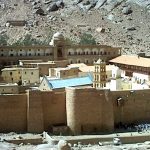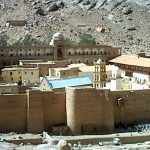By Sameh Fawzi – Al-Shorouk –
No one knew what transpired during the visit of Patriarch John X Yazigi, Patriarch of the Greek Orthodox Church, to Syrian President Ahmad al-Shara‘. Yet the timing and significance of this meeting were certainly surprising. The patriarch is one of the strongest voices heard inside and outside Syria on public issues, and particularly on the condition of Christians. Just days after Damascus fell into the hands of al-Shara‘’s forces, he spoke out against the concept of dhimma (second-class subjugation), insisting instead on citizenship, respect for diversity, and the participation of all Syrians in shaping their country’s future. His voice also did not waver in condemning certain events, such as the widespread violations against Alawites on the coast. Then came, of course, the bombing of St. Elias Church, which added sharpness and courage to his fiery speech at the funeral of the victims. He addressed Ahmad al-Shara‘ directly, describing his phone call of condolence to the Patriarchal Vicar as insufficient—since no state official came to the church except for the Christian minister Hind al-Qubwat. The patriarch also criticized the statement issued by the Syrian presidency, which did not describe the victims as martyrs but merely as having “died in an incident.”
Clips of his words were widely circulated on social media, and his stance gained international support. It is no secret that his remarks angered al-Shara‘, who commented on them without mentioning the patriarch by name, urging senior figures to calm matters and to be more cautious in how they spoke about events. Soon after, voices aligned with al-Shara‘’s regime, especially from mosque pulpits, criticized the patriarch. Against this backdrop of heightened rhetoric and criticism of Syria’s current rulers, the patriarch’s visit to al-Shara‘ attracted the attention of official Syrian media and left many asking: what was its purpose?
At the outset, the visit carried symbolic meaning because the Greek Orthodox Church has historically been regarded in Syria as the “state church.” Patriarch John X, as its head, enjoys considerable standing. It is worth recalling that Russian President Vladimir Putin, accompanied by former President Bashar al-Assad, visited the Greek Orthodox Patriarchate headquarters, and not any other Christian church or denomination.
Some information suggests that the patriarch’s visit to al-Shara‘ came after Russian intervention during Foreign Minister Ahmad al-Shibani’s trip to Moscow, accompanied by Maher al-Shara‘, the brother of Ahmad al-Shara‘. Maher, who was educated in Russia and speaks Russian, reportedly conveyed Moscow’s dual message: urging the regime to mend relations with Christians, and at the same time persuading Patriarch John X to soften his critical rhetoric.
This initiative was carried out through Maher al-Shara‘, who does not hold an official post but acts in effect like a Minister of Presidential Affairs, enjoying influence through his direct kinship with the current head of state. He led a delegation to the Patriarchate to offer condolences for the victims of St. Elias Church a few weeks after the attack—a gesture that was quickly followed by the patriarch’s visit to Ahmad al-Shara‘.
Will Maher al-Shara‘ now take over the Christian portfolio in Syria? And what lies ahead for this issue?
Some may interpret the patriarch’s visit to President Ahmad al-Shara‘ as building bridges of communication for Syria’s stability. Yet from another angle, it played into the hands of al-Shara‘’s regime, which faces a serious crisis in its relations with Syria’s diverse social components—especially after the events on the coast against Alawites, and in Sweida against Druze. More than that, the visit and the new proximity do not necessarily signal a change in the regime’s stance toward Christians, who continue to face numerous violations—most notably exclusion, marginalization, and the targeting of churches, individuals, and families at the hands of the militias of Hay’at Tahrir al-Sham. These militias have become the backbone of the army and security forces, and their ideological outlook brands Christians as infidels and denies them citizenship.
Whatever the motives behind Patriarch John X Yazigi’s visit to Ahmad al-Shara‘—which may also have included raising the case of his brother, Bishop Paul Yazigi, kidnapped since 2013 along with Bishop John Ibrahim by Jabhat al-Nusra forces, according to strong indications—previous experience shows that regimes with Islamic ideological underpinnings are least capable of accommodating diversity within a national framework. We saw this in the Muslim Brotherhood’s rule in Sudan and in Egypt, and in the practices of Islamist formations both within and outside governments. This prompts us to question the Syrian regime’s position toward Christians, which may seem somewhat conciliatory at present in response to external pressure and as an image-polishing exercise after the events on the coast and in Sweida, and after the serious fallout from Israel’s intervention in the Druze issue. But this may not mean a fundamental change—especially given the gulf between words and deeds. Reality, in the end, is what counts.
_______________
Translated from:
https://www.shorouknews.com/columns/view.aspx?cdate=26082025&id=25f84307-3b7e-4931-94f4-18703b971a1e





